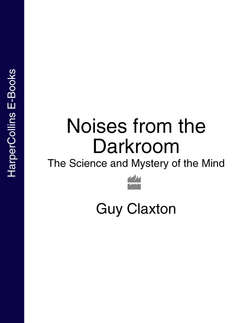Читать книгу Noises from the Darkroom: The Science and Mystery of the Mind - Guy Claxton - Страница 30
The Octopus Discotheque
ОглавлениеImagine a small tropical island, perhaps a few hundred metres across, that has been colonized by a large troop of unusual octopuses who have turned it into a 24-hour-a-day discotheque. At an octopus disco you do not move around much. You all pile up in a big heap, and you extend your tentacles in all directions until you make contact with another octopus’s head. In fact we should really call these particular creatures ‘centipuses’, because they have not eight legs, but hundreds. These legs vary in length considerably, so that some of those whose heads you are touching are beside you, while others can be right across the other side of the dance-floor.
Octopuses, who need their rest as much as anyone, cannot stay awake the whole time. In fact, at any moment, only a small proportion of the total clientele is actively awake. You can tell when an octopus is awake because its skin turns from a dull grey colour to a bright lobsterish pink – as if it has been boiled. When it is awake and ‘dancing’, all it does is make small movements of the tips of its tentacles, thereby making their presence felt by all those other octopuses it is touching. Each octopus can affect its contacts in one of two quite different ways. If it tickles, the octopus on the receiving end is irritated and stimulated, and becomes more likely to wake up itself. But if the first octopus caresses, the other is relaxed and calmed, and is inclined to fall asleep (or more deeply asleep, if it is already asleep). Strangely, these caresses mean that if octopus A has been giving octopus B a gentle, tranquillizing massage, B will become more responsive to other sources of stimulation as soon as A falls asleep.
Each octopus wakes up when the total amount of tickling it is receiving from all the others who have their tentacles on its head, exceeds a certain amount. Like human beings, some octopuses are generally very sensitive, and will wake up and start squirming with only a couple of tickles. Others are heavy sleepers, and it takes the concerted tickling of dozens of tentacles before they come to and join the dance. And others are choosy: they will respond to tickles from certain other octopuses of whom they are fond, but will be more resistant to the approaches of those they care for less.
There are actually three kinds of octopus: those that live on the windward side of the island; those that live on the leewards; and those that live in the middle. Those on the windward have some of their tentacles resting in the sea, and they can be woken up, as well as by tickles on their heads, by particular patterns of waves. These are called the Lookout Squad. It is their job to detect the ripples that are caused by approaching ships, or impending bad weather, or other influences that might disturb the fun. On the other side, the leeward, are the Bottle Squad, whose job it is, if tickled in various ways, to stuff messages in bottles asking for help, or more music tapes, or whatever. In the middle are those who simply pass the tickles around.
The combined effect of this curious collection of stimulating and tranquillizing influences is to ensure that only a small proportion of the assembled company is awake at any moment. And it also ensures that the group of awake octopuses keeps changing. A couple of tentacles start tickling you, you wake up and start swishing your own tentacle-tips; but soon you start to get tired and drowsy, or to succumb to the relaxing massage. So if an observer were hovering over the island on a clear night, she would see these patterns of pink octopus bodies continually shifting around; and she would see a general increase in activity if the wind got up, or if a boat was sighted; and sometimes she would see a flurry of activity on the leeward shore as a bunch of messages were scribbled, stuffed into their bottles, and hurled out to sea. And the observer would notice that the pattern of activity at any moment was likely to be quite widespread throughout the network, not bunched up. She would be more likely to see an irregular pink ring extending across the whole island, rather than a concentrated pink blob.
The observer would also see, if she hovered long enough, gradual changes in the way the patterns of activity moved through the total octopus population, and this is because each time one of octopus A’s tentacles is successfully involved in waking up octopus B, the spot on B’s head where A’s tentacle is resting develops a little bit of extra long-term sensitivity. Now the next time A tickles B, the net effect on B is greater, and fewer other contributing tickles are needed to make B wake up. So the more often A and B are awake at the same time, the better A becomes at wakening B on its own. And the more likely it is, when A is awake and tickling, that it will be B that is roused, as opposed to Z, who A is also tickling, but with whom it has a less successful track record. What is more, if a number of octopuses are regularly involved in each others’ awakenings, then they will develop into a ‘gang’ – what Hebb called a ‘cell assembly’ – who will tend to turn on or turn off as a unit.25
